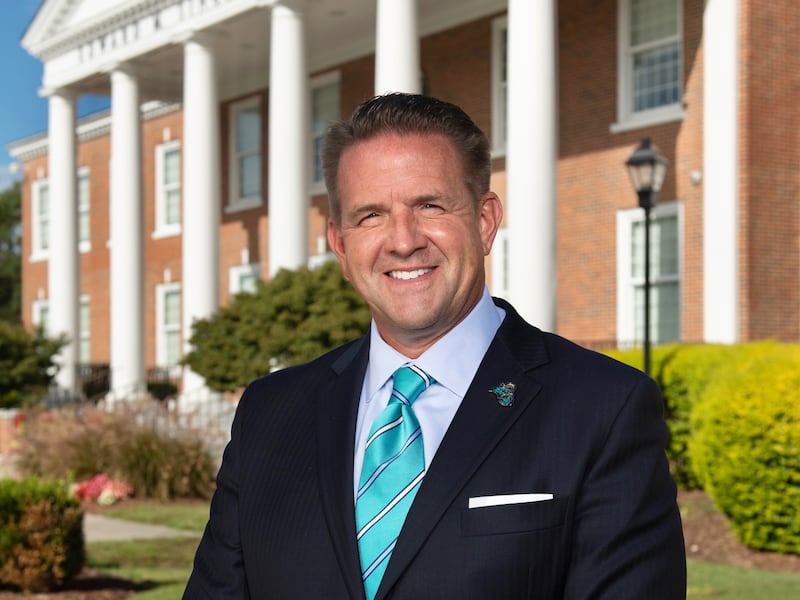Like tens of thousands of Brigham Young University graduates and fans, I’ve been thrilled by this football season’s historic 9-0 start. But as the next president of Coastal Carolina University, my allegiances this Saturday lie with another 9-0 team — across the field from the Cougars.
My time as a student at BYU forever impacted my life in countless ways. Living in Deseret Towers, working at the MTC as a gym instructor, playing for the 1987-88 JV basketball team, interning on Capitol Hill as part of the Washington Seminar program, and spending six months studying abroad at the Jerusalem Center — all these experiences and much more resulted in a challenging and rewarding education that shaped my worldview and helped determine my academic and personal path.
While my time as a student has been spent predominantly at private institutions (BYU, Notre Dame and Johns Hopkins), my entire professional career has been spent at public colleges and universities. In January, I have the privilege of becoming only the third president at Coastal Carolina, a school of over 10,000 students in Conway, South Carolina, approximately 10 miles west of Myrtle Beach. In 2029, CCU will commemorate its 75th anniversary, both as a branch campus of the University of South Carolina and as an independent, state-supported public institution.
For the Chanticleers, its most notable athletic success came in 2016 when — in the school’s first-ever appearance in the College World Series in Omaha, Nebraska — Coastal won the national championship by defeating the University of Arizona, 4-3. More contemporary success was realized last month when, in the span of 10 days, Coastal’s volleyball team secured the East division of the Sun Belt Conference by winning its 18th consecutive game, the men’s soccer team captured the Sun Belt Championship and landed at No. 5 in the nation, the football team collected its seventh game in row and was ranked No. 15 in the AP Top 25, and a Coastal alumnus — and former star golfer — Dustin Johnson collected his first green jacket at the Masters.
This 2020 football season has been absolutely magical for the Chanticleers as they have beaten a ranked team (University of Louisiana), defeated a squad they’ve never beaten before (Appalachian State), reached the highest ranking in Sun Belt history in the College Football Playoff rankings (No. 18), and now have the chance to host their biggest game ever with the ESPN’s “College GameDay” crew in attendance. Not bad for a school whose athletic budget is among the lower quartile of Group of Five institutions.
But Coastal will never argue for its limitations. Rather, the plucky Chanticleers (the mascot traces its origins to Geoffrey Chaucer’s “Canterbury Tales” as suggested by an English faculty member and his students in the early 1960s) take inspiration and encouragement from what other comparable schools have accomplished in recent years.
In many ways, Coastal aspires to be the Boise State of the East. The similarities between Boise State and Coastal Carolina are striking indeed: both were founded as junior colleges (Boise in the 1930s, Coastal in the 1950s); both played FCS football before moving into the FBS ranks (Boise transitioned in 1997, Coastal in 2016); both schools play on other-than-natural-colored surfaces (the Broncos on the famed blue Smurf Turf; the Chanticleers on the teal-hued Surf Turf). Boise State has used its football successes to build its academic reputation and reach, going from associate degrees from its earliest days to scores of bachelor’s and master’s and over 10 doctoral programs at present.
As is the case in other states with better-known Power Five schools in their backyard (Clemson and the University of South Carolina), Coastal goes head-to-head with other public institutions for limited resources while endeavoring to carve out a unique niche as a liberal arts campus setting that boasts offerings similar to what one might find at a much larger comprehensive university. Coastal is the embodiment of a fundamental principle in our American democracy: education as a public good, not a private benefit, and all citizens are blessed when as much education is provided to as many people as possible.
In my 25 years of working in higher education, I have become more and more convinced of the power and the truth of this simple statement from George Washington Carver: “Education is the key to unlock the golden door of freedom.” Carver, an alumnus of Iowa State, was the first African American to be admitted and to graduate from ISU. My grandfather, the oldest of 11 children and the first in his family to attend college, also completed his master’s degree at Iowa State. Both men spent lives and careers in agronomy and agriculture, influencing countless others to acquire as much education as possible.
That is the mission we strive to achieve at Coastal Carolina University — excellence in the classroom, on the football field, or in any other endeavor we pursue — and launching our students to successful careers and fulfilled lives. So, when people ask me which team I’ll be cheering for at Brooks Stadium on Saturday, the politic response should be: “both.” But as much as I owe BYU for my undergraduate experience, I’ll be decked out in Coastal teal and white — and hoping for a Chanticleer victory.
Michael Benson, a 1990 cum laude graduate of Brigham Young University, is president-elect of Coastal Carolina University. He previously served as president of Snow College, Southern Utah University and Eastern Kentucky University.


